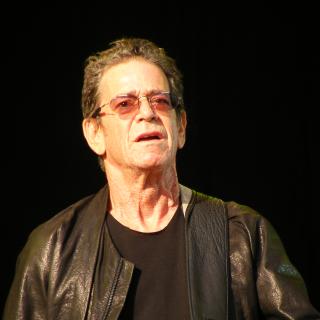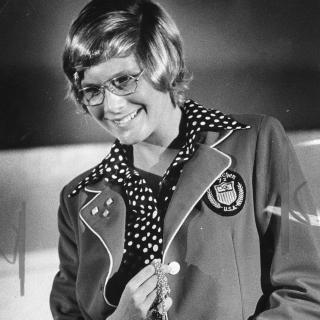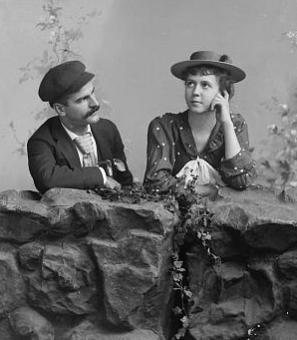1994: World Cup at RFK Stadium Produced One of Soccer's Greatest Goals
This year's FIFA World Cup has produced some exciting matches. But one of the most thrilling goals in World Cup history actually was scored at Washington's RFK Stadium back in 1994, when the U.S. hosted the global tournament for the first time ever.
Some in Washington undoubtedly were disappointed that the District, one of nine U.S. cities selected to host portions of the tournament, lost out to Pasadena, Calif. as the site of the World Cup final. As the Washington Post's Dan Steinberg recalled in a recent blog post, in the early 1990s then-Redskins owner Jack Kent Cooke lobbied U.S. Soccer Federation president Alan Rothenberg for the big game, promising that he would build a new 74,000-capacity arena in time for the event. But Rothenberg thought that the time frame was too tight, and by the time the final list of host cities was announced in 1992, Washington — which had the smallest stadium of all the cities — had lost out to Pasadena, site of the Rose Bowl, and was relegated to hosting four first-round games in June and a round-of-16 contest in July.
Washington wasn't a big soccer town, but it did have some history with the game. The District had fielded several professional teams over the years, including the ill-starred Washington Diplomats who played in the now-defunct North American Soccer League from 1974 to 1981, and for most of their existence struggled so much to draw fans that they actually were exiled from RFK for a season and had to play their schedule at W.T. Woodson High School's field in Fairfax. The team did have one big draw in Dutch midfielder/forward Johan Cruyff, who played a single season in 1980, and in 1981, the final year of the team's existence, they did manage to draw more than 53,000 fans for a contest against the New York Cosmos, which featured Brazilian superstar Pele.
But despite that experience, as the time approached for the World Cup in 1994, the administration of then-Mayor Sharon Pratt Kelly and District police grew apprehensive about the potential for violence as fans from other countries flocked to the District. To the dismay of the U.S. organizing committee, they decided to enclose the playing field with a six-foot-high security fence to prevent any hooliganism. (Oddly, though, they didn't object when the stadium's management ignored the organizing committee's recommendation and opted to sell beer to fans.)
But the inner fence wasn't the only upgrade for RFK and the neighborhood around it. Thoughout the spring, an army of workers labored at the site, building a plaza with a collection of shops and exhibits to peddle World Cup memorabilia, and covering up the Budweiser sign in the south end zone with a red banner inscribed with the 1994 tournament slogan, "Making Soccer History." Locals weren't happy about the amount of effort being lavished upon an event that most wouldn't be able to attend. One neighborhood resident told the Washington Post that it was the first time that he recalled seeing the local streets resurfaced in a quarter century.
All those tense vibes seemed to dissipate when the competition began on June 19, with Norway defeating Mexico 1-0 in a Group E contest. But the real excitement came on June 29, when unheralded Saudi Arabia met heavily-favored Belgium in their Group F matchup. The Belgians only needed a tie against the Saudis to stay atop Group F, but they didn't get it. In the game's fifth minute, Saudi midfielder Saeed Al Owairan took the ball at the midfield line and dashed downfield on a wild run, outmanuevering four Belgian players, and then lofted a shot into the netting past Belgium's Michel Preud'homme. It was the game's only goal. As time ran out, Saudi defender Abdullah Saleh Al Dossari booted the ball into the stands in ecstasy, as the stunned Belgians trudged off the field, grumbling about their missed scoring opportunities — 26 shots and 10 corner kicks.
In a poll of international soccer fans conducted by FIFA in 2002, Owairan's goal was picked as the sixth most exciting goal in the history of the World Cup.


![Two soccer players run after ball in rain. [Reprinted with permission of the DC Public Library, Star Collection, © Washington Post]](/sites/default/files/styles/crop_320x320/public/2025-08/Washington%20Diplomats%20soccer%20game%20-%20DCPL_061_STARSUBJECT_1037_Soccer_Teams_Washington_Diplomats%20%28Star%207%20of%207%29.jpg?itok=Y2KVWCC6)


![Sketch of the mythical fuan by Pearson Scott Foresman. [Source: Wikipedia]](/sites/default/files/styles/crop_320x320/public/2023-10/Goatman_Wikipedia_Faun_2_%28PSF%29.png?h=64a074ff&itok=C9Qh-PE1)












